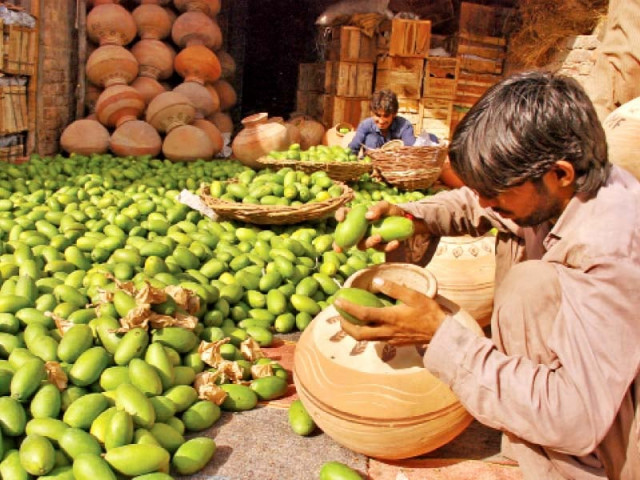Blessing or curse: Mango prices to rise after rains in Sindh
Rains are often a blessing for farmers but they may sometimes damage crops.

The supply of mangoes has been cut short by excess rain and the decreased supply is likely to result in higher prices. PHOTO: SHAHID ALI/EXPRESS
For those employed in the agriculture sector, rainfall after a dry spell is nothing short of divine intervention. This blessing, however, can quickly take the shape of a curse if the rains last longer than usual.
The recent spell of rains in Sindh was greeted with open arms by most farmers. Others, however, found it detrimental to their financial interests. Normally, the rainy season in Sindh starts from the third week in April and lasts until the second week of May.
This year's rains were not only heavier than usual, they were also accompanied by hailstorms and gusty winds. Luckily, the wheat crop had already been harvested and taken off the fields so there was no damage incurred by the wheat growers.
The farmers who had invested in mango trees, however, shared a different story. The incessant rains in the past few days had caused a large quantity of unripe mangoes to fall off the trees. This means bad news for mango-lovers as the prices are expected to be exorbitantly high this season.
Prof Muhammad Ismail Kumbhar of the Ariculture University, Tando Jam, told The Express Tribune that the recent rains had caused extensive damage to the mango farms in Sindh, particularly in parts of lower Sindh. Some of the worst affected areas were Mirpurkhas, Tando Allah Yar, Matiyari and Hyderabad.
In these areas, a large quantity of unripe mangoes had fallen off the trees. In the absence of a post-harvest policy, growers have been forced to sell the produce for as low as Re1 per kilogramme. He advised the government to revisit the agriculture policy as the province was moving towards food insecurity due to the flooding and heavy rains.
According to Prof Kumbhar, lower Sindh is the largest mango-producing belt in the country. Unfortunately, over 40% of the crop has been damaged due to the heavy rains. He added that the wheat-growers always faced difficulty in getting proper prices for their produce due to the government's poor procurement policy.
Our irrigation system, he said, is blessed with fourteen canals but a large percentage of the crops are wasted due to the lack of proper storage facilities. Besides safeguarding the interests of growers, the government should also look after the rights of the consumers, he advised.
Sindh Abadgar Board president Abdul Majeed Nizamani explained that the longer spell of rains this year had created problems for the growers. The worst-affected crop was the mango crop, followed by cotton and some fruits and vegetables.
Agriculture director Riaz Dayo was of the opinion that while the rains had proved to be unfavorable for some farmers, others had benefitted vastly from them. He explained that the rains could have been more harmful had the wheat crop not been harvested yet. The mangoes, he explained, were mostly damaged from the inside due to the hailstorms.
A date palm grower from Thehri district in Khairpur, Haji Abdul Jaleel Memon, told The Express Tribune that the recent rains had been beneficial for the date palms.
The cooler weather, however, was adversely affecting the growth rate of the dates as they need hotter temperatures to grow. The cooler weather means that the dates will take longer to ripen. If in case, the weather does not change, the date palms will be destroyed before they can be harvested.
Published in The Express Tribune, May 24th, 2014.



















COMMENTS
Comments are moderated and generally will be posted if they are on-topic and not abusive.
For more information, please see our Comments FAQ